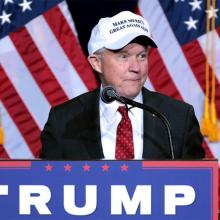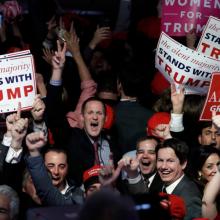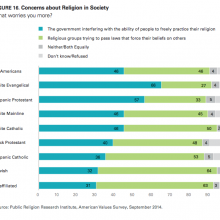public religion research institute
Recently, a report from Public Religion Research Institute (PRRI) found that Black Protestants are the only Christian group in which a majority — 63 percent — believes that congregations should get involved in social issues even if doing so means having difficult conversations about politics. This tells me that white congregations, in contrast, believe that churches are best left as places of solace, where difficult conversations do not take place. Ultimately, this allows for white supremacy to remain intact within these houses of worship. I am the senior pastor of Lake Street Church of Evanston, a predominantly white church, and our path out of white supremacy has required us to take the lead from Black congregations on a variety of social justice issues.
A LOT HAS BEEN written in recent months about how Christian nationalism is a threat to America — and of course that’s right. But it’s also worth noting that it’s a threat to Christianity.
This round of concern really took off when a new poll from the Public Religion Research Institute (PRRI) found that alarming numbers of people believed things such as “the U.S. government should declare America a Christian nation” and “God has called Christians to exercise dominion over all areas of American society.” Nearly 30 percent of Americans mostly agreed (sympathizers) or completely agreed (adherents) with such statements, which is scary enough — but among Republicans that number rose to 54 percent, which means it is the dominant belief system among one of the two parties that frequently swap control of the U.S. government.
PRRI President Robert P. Jones defines Christian nationalism as “the idea that America is destined to be a promised land for European Christians.” Nearly two-thirds of white evangelical Protestants, according to PRRI, qualify as adhering or sympathizing with this belief. Astonishingly, these beliefs cross racial lines. “White (29%), Hispanic (25%), and Black (20%) Christians who identify as born-again or evangelical are each about five times as likely to be Christian nationalism adherents as members of the same racial or ethnic groups who identify as Christian but not evangelical,” the institute reports.

A woman wears a jacket with a QAnon logo while hundreds of vehicles including 18-wheeler trucks, RVs, and other cars are parked as part of a rally at Hagerstown Speedway after some of them arrived as part of a convoy that traveled across the country headed to Washington, D.C., to protest coronavirus disease (COVID-19) related mandates and other issues in Hagerstown, Md., March 5, 2022. REUTERS/Stephanie Keith
About one in five Americans mostly agree with ideas consistent with the QAnon conspiracy theory, according to a new survey from the Public Religion Research Institute. That’s an increase from one in seven since last year.
As the country awaits the Supreme Court decision on federal abortion rights in Dobbs v. Jackson — which many expect will overturn Roe v. Wade — politicians, activists, pollsters, and news outlets are highlighting polling on abortion.
Over 65 percent of Black Protestants, Hispanic Catholics, white Catholics, white mainline Protestants, and white evangelical protestants say their friendship networks are exclusively heterosexual. Eighty percent of white evangelicals said they did not have any LGBTQ people in their friendship network, while 56 percent of religiously unaffiliated people said the same.
Last week, President Donald Trump announced via Twitter his intent to bar transgender from people serving in the military — a move reportedly heavily influenced by the Family Research Council, a conservative evangelical lobbying organization. The Public Religion Research Institute reports that more than one in five Americans have a close friend or family member who is transgender and more than six in ten Americans say transgender people face a lot of discrimination in the country today. This snapshot captures the dynamics of the Trump era: the anxieties and reactionary measures of religious conservatives within a cultural and religious landscape that is dramatically shifting.
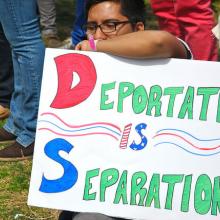
Image via ndlon/flickr.com
A recent study by the Public Religion Research Institute reveals there aren’t any states in the U.S. in which 50 percent or more of its residents support deportation as adequate reform of the immigration system. Even in California, Texas, and Florida, states that respectively have the highest, second-highest, and third-highest number of undocumented immigrants in the country, this holds true.
Sessions has long been, in the words of one prominent immigration advocate, the “most anti-immigrant senator in the chamber.” When George W. Bush, a self-styled “compassionate conservative” and born-again Christian, pushed a comprehensive immigration reform bill in 2007 that was supported by many business and law-enforcement officials, Sessions railed against what he called the “no illegal alien left behind bill” and led the charge against the failed effort. “Good fences make good neighbors,” he said at a press conference the year before.
Americans voted largely along the lines of race, education, and party identification. Nonwhites strongly preferred Clinton, while whites decisively chose Trump. Compared with past Republicans, the businessman received a stunning surge of votes from non-college-educated white voters.
None of this is surprising.
And yet the result upends so much conventional wisdom.
They are many, shift between parties, and typically side with the candidate who ends up winning the White House.
That’s what makes Catholics the ultimate swing voters in the U.S. And this year they are going to throw their weight behind Democrat Hillary Clinton, a panel of political analysts said on Oct. 31.
For some, the choice is not clear. Clinton-Kaine may be the more personally religious ticket, but Trump-Pence is more cozy with the religious right, aka the evil empire among atheists. Then there’s Green Party candidate Jill Stein, who has no chance of victory, but is the only candidate who reached out to nonbelievers and asked for their vote.
So what’s an atheist to do?

Image via RNS/Rawpixel.com/Shutterstock.com
“I think there are a lot of nones who miss singing in the choir, who would love to go into a building and hear a moving speech, but the minute someone starts talking about the Bible they check out. It no longer feels applicable to them. That’s a big challenge to the church.”
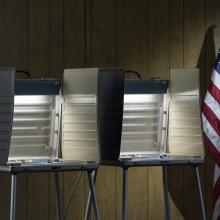
Image via Burlingham/Shutterstock.com
A quarter of U.S. adults do not affiliate with any religion, a new study shows — an all-time high in a nation where large swaths of Americans are losing faith.
But while these so-called “nones” outnumber any religious denomination, they are not voting as a bloc, and may have little collective influence on the upcoming presidential election.
The rapid growth of the religiously unaffiliated, charted in a survey released by the Public Religion Research Institute on Sept. 22, is raising eyebrows even among those who follow trends in American religiosity.
Nadia Bulkin, 27, the daughter of a Muslim father and a Christian mother, spends “zero time” thinking about God.
And she finds that among her friends — both guys and gals — many are just as spiritually disconnected.
Surveys have long shown women lead more active lives of faith than men, and that millennials are less interested than earlier generations. One in three now claim no religious identity.
What may be new is that more women, generation by generation, are moving in the direction of men — away from faith, religious commitment, even away from vaguely spiritual views like “a deep sense of wonder about the universe,” according to some surveys.
Michaela Bruzzese, 46, is a Mass-every-week Catholic, just like her mother, but she sees few of her Gen X peers in the pews.
Did God lift Seahawks quarterback Russell Wilson’s overtime pass into the end zone on Sunday, rewarding the prayerful Christian player with a championship victory and a trip to the Super Bowl?
Millions of Americans may think so.
“One in four Americans believe there will be a 12th man on the field, and that the hand of God will be seen before the final whistle blows in the Super Bowl,” said Robert Jones, CEO of Public Religion Research Institute.
And 53 percent agree God “rewards athletes who have faith with good health and success,” according to a new PRRI/RNS Religion News Survey released Jan. 22.
Indeed, not only did majorities of all but one major religious group put faith in God regarding the faithful, so did 27 percent of the those who claim no religion, the “nones.”
Conservative Christians are taking credit for the Republican sweep of the U.S. Senate and GOP victories farther down the ticket in Nov. 4's midterm elections, and they predict they will prevail again in 2016.
“This is not only the largest single constituency in the electorate, but it is larger than the African-American vote, the Hispanic vote, the union vote, and the gay vote combined,” Ralph Reed, one of the most recognized figures in conservative Christian politics, said Nov. 5 in a celebratory post-election press conference.
Reed, who chairs the Faith & Freedom Coalition, which mobilizes conservative Christian voters across the nation, said politicians in both parties ignore this constituency “at their own peril.”
Reed pointed to a poll commissioned by his group that shows that conservative Christians — Protestants and Catholics — made up 32 percent of the Republican electorate, and that they overwhelmingly voted (86 percent) for Republicans Nov. 4. These voters contributed 52 percent of the total votes received by Republicans, according to the Public Opinion Strategies survey, which had a margin of error of plus or minus 3.5 percent.
But some experts pointed out that little has changed in the religious electoral landscape.
When it comes to concerns over religious liberty, Americans are divided as to which is in more imminent danger: the ability to practice one’s religion without government inference, or the consequences to freedom of others enforcing their own religious beliefs on others. According to the 2014 American Values Survey, released Tuesday from the Public Religion Research Institute, nearly half of Americans (46 percent) say they are more concerned about religious groups trying to pass laws that force their beliefs on others. An equal number (46) say they are more concerned about the government interfering with the ability of people to freely practice their religion.
These are anxious times for white evangelicals, according to two new surveys.
At 20 percent of U.S. adults, they are statistically neck-and-neck with the “nones” — people who claim no religious brand. “Nones” now tally up to 19 percent in the 2014 American Values Survey, said Robert Jones, CEO of the Public Religion Research Institute, which released the survey Sept. 23.
Evangelicals, said Jones, are on “the losing side of the culture wars, such as gay marriage, and they see that their share (of society) is shrinking and aging, adding to their sense of being embattled.”
“They can no longer say confidently they speak for all people of faith.”
Perhaps for that reason, white evangelicals, more than any other religious group, worry that the government will interfere with their religious liberty.
The survey asked which concerned people more: The government interfering with their ability to “freely practice their religion” or “religious groups trying to pass laws that force their beliefs on others.”
The overall answer was a tie — 46 percent of Americans overall for each viewpoint. But white evangelicals were significantly more worried about government interference (66 percent) than any other group.
Most Americans say the waves of children crossing into the United States from Central America are refugees fleeing danger at home. And they say the United States should support these children while reviewing their cases, not deport them immediately.
Democrats (80 percent), independents (69 percent), and Republicans (57 percent) favor offering support to unaccompanied children while a process to review their cases gets underway.
Most major religious groups say the same, including white evangelical Protestants (56 percent), white mainline Protestants (67 percent), minority Protestants (74 percent), Catholics (75 percent), and the religiously unaffiliated (75 percent).
(The survey sample of 1,026 adults was not large enough to capture the views of smaller religious groups, such as Jews, Muslims, or Mormons).
“It makes a difference that we are talking about children facing violence and harm,” said Robert P. Jones, CEO of PRRI. “The value of keeping families together cuts across all party lines.”






